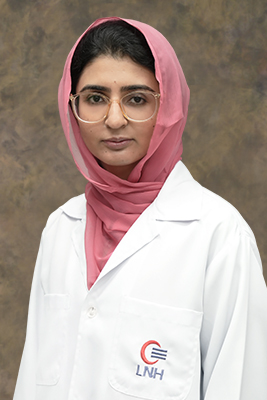Infectious diseases are caused by infectious organisms such as bacteria, viruses, fungi, or worms. Normally, when the immune system of the host is fully functional, disease symptoms may not develop. If immunity of the host is compromised, or the infectious agent overcomes the immune system, an infectious disease occurs.
At LNH, Paediatric Infectious Diseases specialty clinic has been developed to diagnose, treat and prevent diseases caused by an infectious agent, in children from birth through the teen years. Consultations are done both for admitted patients and in the out-patient-department.
Services
Paediatric Infectious Diseases services at LNH are fully backed up by state of the art department of radiology, microbiology, molecular pathology and histopathology laboratories. We have support of other paediatric sub-specialties e.g. Cardiology, PICU, Surgery and Neurology. Additional supportive services are provided by qualified clinical pharmacists and infection control & prevention staff.
A wide range of infectious and immunologic diseases such as those caused by bacteria, viruses, fungi, and parasites are treated at Paediatric Infectious Diseases specialty clinic. Paediatric infectious diseases specialists are also consulted for diseases that are complicated or atypical, including:
- Tuberculosis (TB)
- Hepatitis
- Meningitis
- Respiratory infections
- Bone and joint infections
- HIV-infection & Acquired Immunodeficiency syndrome (AIDS)
- Illnesses that are of unclear cause, have prolonged fever, or are recurrent
- Infections caused by organisms resistant to common antibiotics
- Life threatening infections, like sepsis, bacteremia, endocarditis, etc.
- Immunodeficiency, primary or secondary due to chemotherapy/transplant
Frequently Asked Questions
Paediatric infectious diseases specialists have adequate knowledge, training and experience in diagnosis, management and prevention of infections in children and can provide the best possible care in infections which are difficult to diagnose and treat.
Not all infectious diseases require a sick child to be seen by a paediatric infectious diseases specialist. Many times, common infections can be treated by your primary care physician. However, your child may be referred to us if his/her physician is unable to identify the cause of the infection and provide an accurate diagnosis, or if the condition doesn’t respond to treatment. Our specialized training and diagnostic tools will help determine the cause and type of infection he/she may have, as well as the most effective approach to treatment for it. We also see healthy children who plan to travel to foreign countries or locations where infection risk is higher. In these cases, we can help determine whether special immunizations or other preventive measures are necessary to help protect them while they travel abroad.
Paediatric Infectious Diseases specialists are like medical detectives. We examine difficult cases and pick up clues to identify the culprit and solve the problem. Most of our work is done behind the scene as we make diagnoses and coordinate plans with emergency physicians or other medical professionals to treat the infectious diseases. From reviewing medical data — including X-rays, blood work, and wound culture results — to performing physical exams, our team will determine the cause of the infection, pinpoint the type of disease or condition and create the best treatment plan for you.
Just like every patient is different, so are our treatments. Although we do not perform surgical procedures, we do design treatments based on our unique understanding of the way certain medications interact with the body and with infections. Our treatments consist of medicine — usually antibiotics — to help battle your child’s infection and prevent it from recurring. These medicines may be given orally (in the form of pills or liquids) or administered directly into veins, via an IV tube.
Be sure to give your child’s all previous medical records related to this condition, including X-rays, laboratory reports and immunization records. Also, provide a complete list of all the medications he/she is currently taking — be sure to include over-the-counter (nonprescription) medicines — as well as any allergies he/she may have.
Faculty

Contact
Please call us on 021-34412474.

